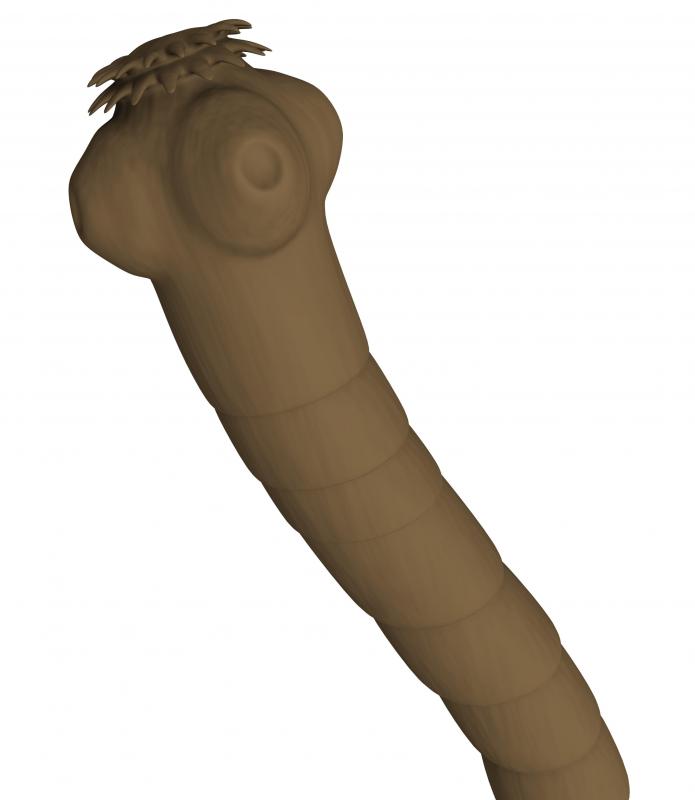At TheHealthBoard, we're committed to delivering accurate, trustworthy information. Our expert-authored content is rigorously fact-checked and sourced from credible authorities. Discover how we uphold the highest standards in providing you with reliable knowledge.
What is a Parasitic Infection?
Parasitic infection is contamination of one organism with another living organism that then begins to feed off or reside in the initial organism. In humans this generally means infections with very large parasites that can be seen, such as tapeworms or with tiny ones like amoeba that take intensive laboratory study to find. When most humans have a parasite infection they become ill, because their bodies are not supposed to play host to other large or small organisms of certain types, and these other organisms can cause destruction to the body including death if they are not somehow removed.
The greatest chance of getting parasitic infections tends to occur in underdeveloped countries, where methods of keeping the water supply free from amoeba or large parasites may not be as advanced. Certain parts of the world run much greater risk for people getting parasitic infections than do others, and these include parts of Asia, Africa and South America. In other parts of Asia, much of Western Europe and most of North America, the likelihood of getting a parasite infection is much lower, though it still exists.

It’s fairly easy to get a parasitic infection from drinking untreated water for instance, and there are plenty of people who might do so on a camping trip and end up with conditions like giardia. Other ways in which parasites can be passed to a host are through the consumption of undercooked meats or through raw fruit or veggies contaminated by them, bites from certain insects, directly from another person with a parasite infection, or by direct contact with parasites, such as by playing in the dirt where there might be animal droppings.

Often, a parasite infection affects the gastrointestinal tract, and people’s response especially to amoebic infection may be what seems like never-ending stomach flu. People have diarrhea and vomiting for long periods of time. Other large parasites like tapeworm may not cause stomach flu symptoms, but survive instead by taking away and consuming part of the food humans consume, and this can lead to severe malnutrition. Complications from a tapeworm may also arise as new worms are born and move into others areas of the body.

In order to appropriately treat a parasitic infection it must be diagnosed first, and best treatment must be considered for the specific parasite. Diagnosis may be made through a number of means. Many times, doctors evaluate stool samples to look for evidence of parasites, but they may also find parasites through x-ray or other scanning methods, and through skin swabs of certain areas of the body. Next, most people will go on a course of anti-parasitic medicine, which can last for several months. People are usually retested at this time to make sure the medicine has worked effectively, and they may be tested again some months later to make certain that another infection hasn’t occurred.

As with many types of infections, a parasite infection tends to be most dangerous to people who are vulnerable medically. This can include people with autoimmune diseases like HIV, and those who are very young and very old. However, anyone can get parasitic infections, and when diagnosis is missed, this can result in extreme illness.
AS FEATURED ON:
AS FEATURED ON:















Discussion Comments
Yes, sushi is a risky food to eat!
@Penzance356 - I was just looking around for some sushi recipes when I saw your comment here. As a long time sushi eater I think there are some basic rules to follow to help avoid parasitic worm infections.
First, and this may seem obvious, only eat at places that prepare and serve food in proper, sanitary ways. If I'm at a new sushi bar I check out the floor, bathrooms and general space. The best type are those where you can see the food being prepared.
Don't be put off by fish which has been frozen. Some types need this to kill off the worms which may be inside.
Lastly, do some research, so you can choose saltwater fish, they are much safer. I love tuna but never touch salmon for this reason.
This may be a bit gross but my friend recently came back from Tokyo, Japan, with some stories about a parasite museum there. Evidently the star attraction is an eight meter tapeworm which was taken from a woman's body a while back!
It seems she didn't even have any symptoms of a parasite infection, which I find mildly disturbing. I'm trying to convince myself that parasites and humans are a rare combination.
If you risk a parasite infection from eating undercooked meat, does this mean that sushi is a risky food to eat? (Hoping not, as I really enjoy this once in a while.)
Post your comments